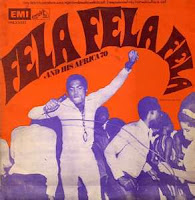Kalakuta Republic was the name musician and political activist Fela Kuti gave to the communal compound that housed his family, band members, and recording studio. Located at 14 Agege Motor Road, Idi-Oro, Mushin, Lagos, Nigeria it had a free health clinic, and recording facility. Fela declared it independent from the Nigerian government after he returned from the United States in 1970.
The word "Kalakuta" was a caricature of a prison cell named Calcutta that fela inhabited.
The compound burned to the ground on February 18, 1977 after an assault by a thousand armed soldiers. Before the attack on Fela's home, he made a record called Zombie, about the Nigerian military regime.
In the song, soldiers are called zombies for obeying orders blindly. One of the lines of the song, in pidgin English says, "Zombie no go walk unless you tell am to walk", i.e., a zombie won't walk unless commanded to. While not criticising the idea of military service generally, Fela was frustrated with the Nigerian army's rank and file that allowed corruption and intimidation of their communities by the corrupt and rich top brass, while blindly following orders to intimidate Nigerians.
 The song was popular in Nigeria, upsetting then Head of State General Olusegun Obasanjo. Obasanjo had been a schoolmate of Fela's in primary school in Abeokuta. The military was unhappy with Fela's constant criticism and said it was unseemly to have a republic within a republic. Nigerian tabloids carried lurid but unverified tales of girls lured to the compound by Fela's band members and corrupted.
The song was popular in Nigeria, upsetting then Head of State General Olusegun Obasanjo. Obasanjo had been a schoolmate of Fela's in primary school in Abeokuta. The military was unhappy with Fela's constant criticism and said it was unseemly to have a republic within a republic. Nigerian tabloids carried lurid but unverified tales of girls lured to the compound by Fela's band members and corrupted.During the attack on Kalakuta Republic by Nigerian soldiers, Fela's mother was thrown from a window and died after an 8-week coma.
Following this attack, Fela married 27 of his backing singers in a mass wedding ceremony at the office of his lawyer, Tunji Braithwaite. Fela said he would not have marital relations with all of the women as the tabloids suggested, but had married them as they could not find employment after the recording studio had been burnt down. According to Fela, in African tradition, when a woman was in danger of being left destitute, it was the duty of a man in her community to marry her as a means of offering protection.References
Fela: The Life and Times of an African Musical Icon By Michael E. Veal, p. 143






















